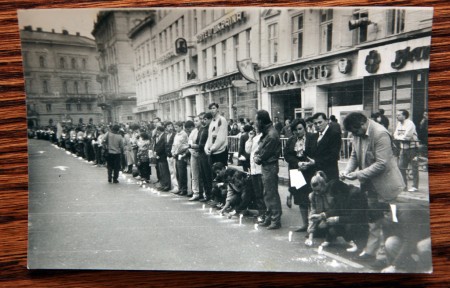Ordinarily, the multi-generational family story is my least favourite kind of novel. I usually find them tedious and uncompelling. It speaks especially well of Junot Diaz’s book, then, that I found it engagingly written and worthwhile, though a rather darker read than I was expecting.
Diaz succeeds in giving distinct voices to his multiple narrators, though it wouldn’t have hurt to identify them at the beginning of each section. The book is also full of poignant and clever descriptions, though they may be a bit crass for some tastes. Diaz’s writing includes many untranslated Spanish passages, some of which at least provide hints of meaning to speakers of English and French, while some of which are simply incomprehensible without assistance. It also includes numerous references to science fiction and fantasy books, which are a passion of the novel’s titular figure.
Perhaps the most compelling aspect of the book is the way in which it effectively expresses the experience of living in a dictatorship that is also a police state: the arbitrary arrests, the inconsistent application of justice, the torture, the rapes, the fear, the spying between neighbours, the absurdity, and the inevitable abuse of power by the secret police. Diaz is very effective at conveying an impression (I cannot judge how accurate) of what the Dominican Republic was like under Rafael Trujillo, the man who looms over the book but whose assassination is relegated to a long footnote.
Reading The Brief Wondrous Life of Oscar Wao could serve as a bit of a vaccine for those who are frustrated by the imperfections of democracy and who wonder whether a benevolent despot might do better. With visceral language that makes for anxious reading, Diaz expresses the injustices that arise when power exists without oversight.


I really loved this book. I thought that the mood was portrayed brilliantly and the characters were multi-layered and deeply vulnerable. I also thought that the depiction of the family in all of its disfunction was beautifully done. I agree that “The Brief Wondrous Life of Oscar Wao” made me feel very grateful for living in Canada. Have you read anything else by Junot Diaz?
I would love to read this! Great recommendation. If you’re around this summer, may I read it?
I found the book quite good. One test of a book is how much I remember after the passage of years after reading it. This book and its memories stayed with me. I was fascinated by three aspects:
1. the multi-generational story especially that of the grand-mother and granddaughter
2. life in the Dominican Republic under Trujillo, who was its dictator for so long.
3. How a society transports itself and morphs upon immigration.
I’m reading this one right now. So far the voice is gripping, but the Spanish segments are driving me batty. We’ll see how it washes out in the end.
Lynn,
I think the solution I found to the Spanish sections was to gloss over it. I do not read Spanish. I confess to using the glossing over technique in other books, even in English.
I found I could often guess at the meaning of Spanish words and phrases, based on context, linguistic similarities with English or French, and sometimes Latin roots.
Hi Alena, Drown is his first book. It is a collection of short stories and is somewhat based on his childhood. You will also find Yunior in the story as well.
Also i was born in the D.R. and it was not so bad (post Trujillo). I had food, forks, plates, running water (amazing),a toilet, a car, a home, big back yard, friends, went to good schools.
You should never compare two countries, different histories and experiences. I have family members who were affected by that era and they don’t even compare it to anything (its life).